The Iron Lady
 for some violent images and brief nudity.
for some violent images and brief nudity.
Reviewed by: Scott Brennan
CONTRIBUTOR
| Moral Rating: | Average |
| Moviemaking Quality: |
|
| Primary Audience: | Adults Teens |
| Genre: | Biography Drama |
| Length: | 1 hr. 45 min. |
| Year of Release: | 2011 |
| USA Release: |
December 30, 2011 (NYC/LA) January 13, 2012 (wide) DVD: April 10, 2012 |
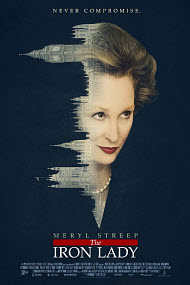

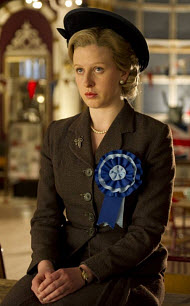
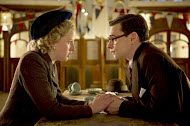
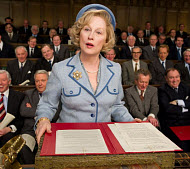
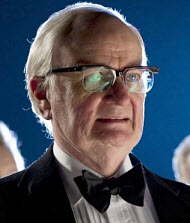
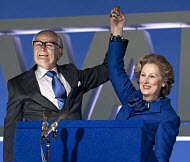
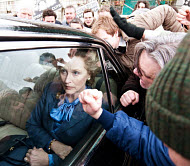
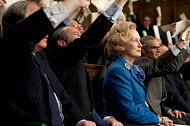
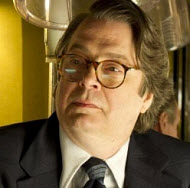
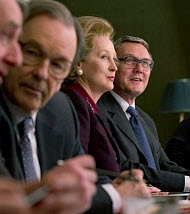
| Featuring |
|---|
|
Meryl Streep … Margaret Thatcher Jim Broadbent … Denis Thatcher Iain Glen … Alfred Roberts Harry Lloyd … Young Denis Thatcher Anthony Head … Geoffrey Howe Richard E. Grant … Michael Heseltine Olivia Colman … Carol Ronald Reagan … Himself (archive footage) See all » |
| Director |
| Phyllida Lloyd—“Mamma Mia!” |
| Producer |
|
Film4 UK Film Council Canal+ See all » |
| Distributor |
“Never compromise.”
Margaret Thatcher once said: “What Britain needs is an Iron Lady.” She also said that “Being prime minister is a lonely job… you cannot lead from the crowd.”
This biopic portrays the truth of both of those quotes in the fait accompli-performance-of-a-lifetime by the classic actor of our time, Meryl Streep. She brings to the big screen the Margaret Thatcher I remember, as well as the one I don’t. The tumultuous period of Britain in the early 1980s with the strident Thatcher speeches are meticulously recreated and well-performed by Streep—portraying Thatcher’s glory days—those days I remember—and so too are the twilight years, the days I knew little about. They are the lonely years “after” she was prime minister—when fading from the public eye—though certainly not from her family, in private—where she remains to this day.
From the first minute of the film, when Streep appears on screen as an old Margaret Thatcher slipping past her handlers to go buy a pint of milk at the corner grocers, I forgot that it is Meryl entirely. It is more than the outstanding make-up job; it is that chameleon thing that Meryl does where she becomes the character. It is Margaret Thatcher on screen, and no one could convince you that it wasn’t.
Okay, the cat’s out of the bag. If it’s not obvious, I am a Meryl Streep fan, as I have let on in some of my other reviews. (“It’s Complicated” and “My Week with Marilyn”). Nonetheless, her performance is astounding, my personal bias notwithstanding, or at least I can say I am not the only reviewer writing this opinion. I truly believe that this is the year she will finally garner not only her 14th Best Actress nomination for the Academy Awards® (17th nomination, overall), but also the year she will receive her 3rd Oscar®.
With the Streep commendations out of the way, I can also say that I haven’t been so moved by a film in this genre since I was taken by surprise with “Frost/Nixon” back in 2008. While it should be common knowledge that all history is subjective, depending on the author (Scripture as the only exception), and though I may disagree with that which is portrayed or written by the authors, these historical pieces appeal to what I believe is the human tendency for introspection. As a political science major, these biographies hold a natural place of interest for this reviewer by default, but even for ordinary moviegoers, the glances back in history ostensibly allow viewers to remember, “where they were” at a given place in time. Reminiscing is not just a pastime for the elderly.
There are a couple of important things I would like to say about this film, and no more, lest I take away from what surprises the film may hold for future viewers. First is how appropriate the film is as substantive input for our current national political debate about the “haves” vs. the “have-nots.” It is about the mob mentality that demands “x, y, and z” from the government—be they the mobs of Britain in the 1980’s or the U.S. mobs called Occupy Wall Street in the 2010s. The political divide that currently rages between just “how big should government be” here in the U.S.—was the same one going on in the early days of Thatcher’s initiation as prime minister of Great Britain. Thatcher’s ability to use her “inter-personal skills” to coalesce common sense perspectives in the Parliament, despite tremendous opposition was remarkable, hence her reputation as the Iron Lady.
Director Phyllida Lloyd (“Mama Mia”) manages to connect her strengths and struggles as the Prime Minister from the IRA bombings, to the Falklands War, to the treachery within her own cabinet with the “flashback device” common to films of this genre. There are scenes from Thatcher’s younger days in her father’s grocery store, her days at Oxford, meeting her husband-to-be, along with actual newsclips and stills interspersed. It’s definitely a piece of history worth revisiting.
The second important thing I would like to emphasize about the film is its reflection on Thatcher’s “intra-personal” observations, particularly after the death of her husband Denis (Jim Broadbent) in 2003. In many ways, the film is focused more on this period of her life than any other. It is a controversial script written by Abi Morgan, which deals with this difficult period of her life after Denis’ death, and it is a matter of interpretation how much dementia is being projected by Morgan and how much is really based on fact. [In reality, Mrs. Thatcher made a number of significant public appearances during this period, including ones in the U.S. So it’s probably less than genuine that she would be quite as disoriented as the film suggests, my only objection to the film.]
In some ways, this sub-plot becomes a distraction, but the overarching feeling that appears subtly is that we all must deal with our losses in our own way. In her memoir, she did pay tribute to Denis with a quote I started this review with:
“Being Prime Minister is a lonely job. In a sense, it ought to be: you cannot lead from the crowd. But with Denis there, I was never alone. What a man. What a husband. What a friend.”
For those who know biopics, it isn’t quite as good as “The Queen” (2006) or “Frost/Nixon” (2008), but close. If you’re fond of history or a Streep fan, then this film is for you. I’m sure there is some inappropriate language, but it isn’t significant, and it fades seamlessly into the background fabric of the film. There are minor violent scenes during the IRA flashbacks or those dealing with the Falkland bombings, but nothing more than the nightly news. There are some minor sexual innuendos, as well, but minuscule and minor, as I recall. Even though the role of Thatcher is played by the politically liberal Streep, to her credit, Meryl plays her honestly and without malice.
In a recent interview, Meryl said, “As I did with Margaret Thatcher, I feel defensive about every character I play, and I defend them as if they’re my own, because for the time I embody them, they feel like me.”
Regardless of how one feels about Margaret Thatcher, or her politics, one thing that stands out in this film is the sort of George Bailey (“It’s a Wonderful Life”) realization that one person can make such a difference in the world, and that Margaret, like George, represents us all, and that extraordinary people are simply ordinary people, who do extraordinary things with God’s help (Daniel 11:32). I also couldn’t help reflect on someone whom she greatly admired during her tenure and whose state funeral she attended in 2004—that of President Reagan. Contemplating them both, the Scripture came to mind from Revelation 21:24:
“And the nations of those who are saved shall walk in its light, and the kings of the Earth bring their glory and honor into it.”
Even before she has left this Earth, she is a legend in her own time. I can’t help but believe, that she, like Ronald Reagan, will one day bring her glory and honor into the light of His kingdom.
- Violence: Moderate
- Profane language: Moderate— “by G*d” and “my G*d” (1), For G*d’s sakes, d*mn (2), h*ll (3)
- Vulgar/Crude language: bugger (1)
- Nudity: Moderately Heavy— bare-breasted woman (brief), cleavage
- Sex: kiss (brief)
See list of Relevant Issues—questions-and-answers.


Moral rating: Better than Average / Moviemaking quality: 4½
I enjoyed it, and I think I’ll enjoy it even more with time. By far, its greatest and most profound message is that life should never be about who you can become (powerful, famous, etc.), but what you can accomplish for good. Margaret Thatcher was unafraid to do that for England—in spite of being hated by the liberal public; she never backed down or merely tried to save her own reputation.
One thing I will say that your reviewers missed, however, is about a five second shot of a topless woman in some news footage after the announcement that the Falkland Island war was over. That took my opinion of it down a notch.
Moral rating: Better than Average / Moviemaking quality: 3½
Moral rating: Offensive / Moviemaking quality: 5
Where was her role in the collapse of Communism? Imagine a biopic of Ronald Reagan focusing mainly on his later years battling Alzheimer’s, and leaving out his contributions to the fall of Communism. Decent film for it’s entertainment value, but misses the boat on historical accuracy. A smear job dotted with a few niceties.
Moral rating: Average / Moviemaking quality: 4
Moral rating: Better than Average / Moviemaking quality: 4½
Movie goers are subject to the public’s hatred of her with them beating on her car, protesting with signs and little is ever done to counter balance this. It is hard enough to encourage the young women of today to be what they were created to be, let alone show a strong woman in a film that seems to almost feed on poor perceptions that she missed the mark, because she stepped out of her female confinements.
The script was compressing an enormous time line. Sadly, that causes there to be a choppy feel to the movie. Major events, the fall of Communism, for example, seem to be mere mentions as to where a dialoque at a cabinet meeting with the Prime Minister correcting written agendas and their grammar played on to an uncomfortable ending.
The acting is no doubt top notch. Given the script, I have no doubt the performances were true to the writers and directors desires. The costumes and makeup were tremendously well done. I have no doubt there will be accolades about this movie during the Oscars. I, cannot add to them.
I was hoping to show a teenage daughter a moment of encouragement, to share with the world all that was given to her in strength and courage. This movie only made a shadow out of what should have been a bright example.
Moral rating: Average / Moviemaking quality: 3½
Moral rating: Good / Moviemaking quality: 4
The filmmaking quality is very poor, as well, in that the film annoyingly goes back and forth between her as a demented old woman, young woman, and her midlife, emphasizing her demented state, in which she has long and annoying imaginary conversations with her deceased husband.
This is not a fair and accurate portrayal of one of the great leaders of the 20th Century. I wish I could get my money back.
Moral rating: Very Offensive / Moviemaking quality: ½
Moral rating: Average / Moviemaking quality: 4
PLEASE share your observations and insights to be posted here.
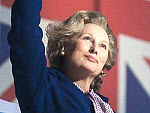

As far as any offensive content goes, the language was minimal, and the violent images no worse than what you’d see on the news, and the few moments the men on screen degrade women and laugh at Margaret’s attempts to be more than just a housewife, it’s more than overlapped by the leaps she makes in politics, and sends a strong message to everyone that no matter how small a role you might play now, if you have the drive to make something happen, it’s not impossible.
My Ratings: Moral rating: Average / Moviemaking quality: 4½